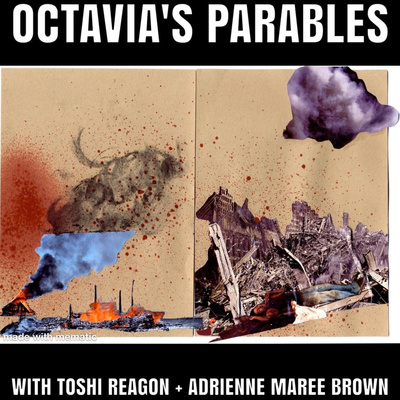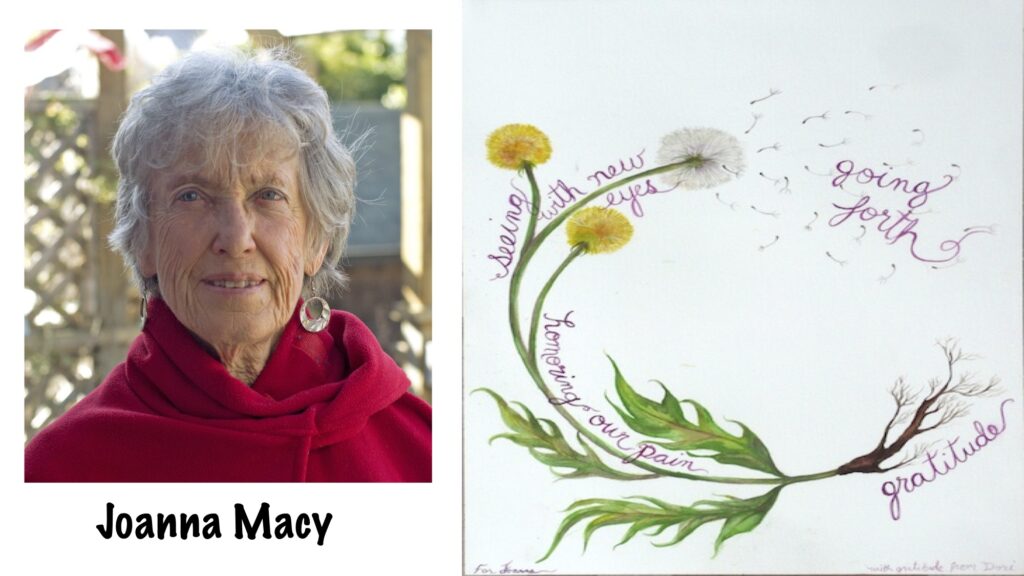Part I
I have some challenging questions for us, which I pose with love for you, for us, and for this aching world. I cannot promise you hope in this sermon, but as a good modern Universalist, I can promise you love. If this morning is a morning when you just cannot bear a heavy sermon, you are invited to exercise self-care and engage a different spiritual practice.
Which future are you preparing for? Which future are WE preparing for?
Is it the one you were ostensibly promised, told you would be able to pass onto the next generation? One that looks more or less like your own: cars (but perhaps electric ones), central air (with solar panels, of course), gratifying employment (or chasing it), easy consumption of items from across the globe delivered to your door with the click of a button?
Perhaps in that future the social safety net is actually enough, rather than the not-really-adequate one we have now. Or the broken health care system.
As Unitarian Universalists, we generally do not accept a theology of a divine, gendered voice commanding us to prepare for the future. So from whence do we source our instructions? From where come the instructions to escape the impact of what we have wrought on the planet? the guidance for how to reckon with the consequences of our own actions?
Is it the various reports from the Intergovernmental Panel on Climate Change? The one that says we need to stop now – well, actually, decades ago, but since we didn’t, now is all we have left and we still might not choose it?
Stop our fossil fuel consumption. Stop most all forms consumption that we have here in the so-called West, that many of us in this country have come to expect as our, forgive me, our god-given right.
The story of Noah’s ark, found in the scriptures of Judaism, Christianity, and Islam, suggests that at a particular point in Ancient Times, there was one correct set of instructions for surviving an extreme climate event: those handed down by the one god. Most people living at the time, deemed corrupt by god, were excluded from these instructions. But Noah followed the instructions, bringing along with him his family (and some green alligators and long-neck geese…). They built an ark, a floating zoo, just before the whole known world was lost to a great flood. They survived into the only future.
Unitarian Universalists understand this as story, not history ~ a part of a wider mythology that informs many cultures. Yet while ancient scripture may not offer fact, it does offer the possibility of wisdom and reflection. For us today, it is our jumping off point: for which future are we preparing?
We are not like Noah. There are more than one set of instructions here in our post-modern world. Many instructions, plus there are our aspirations and then there are our actions. Each of us, all of us, will have to choose. Actually, we are already choosing, every day. By our actions and by our inactions.
It was a timely question for Noah, his family, and his community. It’s a timely question for us.
Timely, given that Jeff Whazhisname and Whoever Branwhat, are following instructions that take them to the edge of space, when ~ instead ~ they could choose to solve childhood hunger. Frankly, given the amount of their vast wealth, they COULD do both. I’m pretty sure their instructions are not god-given, but come from a place of greed. I’m pretty sure their instructions are based on individualistic self-preservation, not collective liberation as our Unitarian Universalist principles and values direct us.
It’s not easy. Some of the once-good instructions no longer are. Recycling plastic used to be a thing – a practice we hoped would allow us to continue to consume at the levels to which we had become accustomed. Except it’s turned out, there is nowhere for plastic to go. There never really was.
Some instructions tell us that if we stop using fossil fuels and become carbon neutral by 2050 or 2035, we can just shift our energy use but keep our consumptive habits as they are. Friends, these instructions, are also an illusion. An intoxicating, dangerous one. These instructions might slow the collapse, which is a good thing, but in my estimation and that of those I trust, it will not stop it.
I ask these questions in all humility because I have not yet been able to wean myself off of using Amazon, which funds Jeff whatshisface’s misguided and not only selfish folly, but folly harmful to the rest of us. I find it difficult to extricate myself from those instructions. Consumption. Convenience.
As I know you are, I am trying in small personal ways that fit my class position – I drive a ten-year old, used hybrid car. We are turning part of the yard at the parsonage into a large garden, planting and harvesting food that we share with our neighbors. For 35 years I have followed a diet of no meat.
Yet full disclosure: I took two airplane flights this summer and currently plan three more by this time next year. Modern, pre-collapse life seems to have instructions embedded within it for the very collapse we seek to avoid.
So, as I am asking you this question, I am asking myself: what future are we truly preparing for?
Part II

“What future are we preparing for?” I came across this question while listening to my favorite podcast. Led by community organizer and author, adrienne maree brown and singer-song writer, Toshi Reagon, it’s focused on the Parables books written by Octavia E. Butler. Each podcast includes questions to ponder, applying the novel to our lives, which is apt, because it’s a story about dystopian American life, beginning in 2024 and includes a presidential candidate who runs on the motto of making America great again – did I mention it was written in the 1990s?
Butler’s Parable books have become a kind of sacred text for me, particularly as visionary fiction helps me manage my anxiety about what the future holds. The Parable books actually have a sacred text that emerges, put down on paper by the protagonist: 15-year-old Lauren Olamina. It’s called EarthSeed: Book of the Living. Last year, part of my spiritual practice was to write daily a reflection on each of the verses; there are 66 verses, so it kept me company for that many days. I’ll be talking more about the Book of the Living when I preach about Not That God in October.
The instructions in the Parables books are concrete: learn to read maps, collect seeds, have a go-bag ready, learn self-defense, and most importantly: know when to choose compassion over competition. The instructions in EarthSeed: Book of the Living are philosophical, such as:
Belief
Initiates and guides action—
Or it does nothing.
or
Drowning people
Sometimes die
Fighting their rescuers

The other sacred text helping me prepare for the future is the Work That Reconnects. You have heard me speak of it more than once. Not a single book, but resources developed by Joanna Macy, further developed by the community that has been birthed by the Work That Reconnects. The instructions here call us to prepare for the Great Turning, rather than contribute to the Great Unraveling. These instructions call for actions to stop the damage being done, generative actions based on ancient wisdom and new ways, and a shift in human consciousness that understands this planet as a living being of which we are a part. Knowing this beyond pretty words but in such deep ways it transforms our behaviors and choices.
This pandemic, when it has not exhausted us to our core and traumatized us in subtle and not-so-subtle ways, demands that we answer the question about our future. We try to lead our daily lives but the question is relentless. It forces us to confront the gap between what our actions actually are and what a sustainable future requires.
It forces us to think not only about welcoming climate refugees as if they are someone apart from us, but to confront the possibility that we (and our children and grandchildren) may become climate refugees in our lifetimes. I say this hard thing, knowing that we have guests from different parts of the country ~ upstate New York, the suburbs of Philadelphia, and coastal Florida. I say this, having just read in the New York Times last week how New Jersey, where this congregation is, has seas rising at twice the global average because the land is also sinking.
We need to prepare now for the future that is already here. We see it in the pandemic, which was brought on by our extractivist avarice and its impact on the environment, letting lose a lethal virus that might otherwise have stayed among wild creatures had we not encroached on their habitat. We see it in the wild fires in the west of this continent, in Turkey, Italy, Finland, Greece, Siberia, Lebanon, Indonesia. We see it in the flooding in Germany and Central China. Hard not to think about Noah’s Ark … We see it in the heat islands in all our cities, like New Brunswick here, where areas with few shade trees, much concrete, and low access to air conditioning, which often means more heat-related health challenge like asthma impacting disproportionately those living in poverty and Black and Brown communities.
Friends, whatever we do, let’s not listen to Jeff Whazzhisname. Or Whateverface Branwhat. Or Elon Whoever. They have given too little to the common good. They have taken too much.
For many of us, it’s not going to be god-given instructions but ones we must discern from the cacophony of options, guided by Unitarian Universalist principles and lived values. Guided by compassion and love. Given what we are facing, whether or not we can access hope, we can always choose love.
I invite you to attend next Sunday’s service, which follows on this one, with a message from the future.
So be it. See to it. Amen.
The video below contains both the reading and the sermon in its two parts. The reading is a recent poem by Rev. Theresa Ninán Soto, used here with their permission. The sermon makes more sense after having experienced the poem.